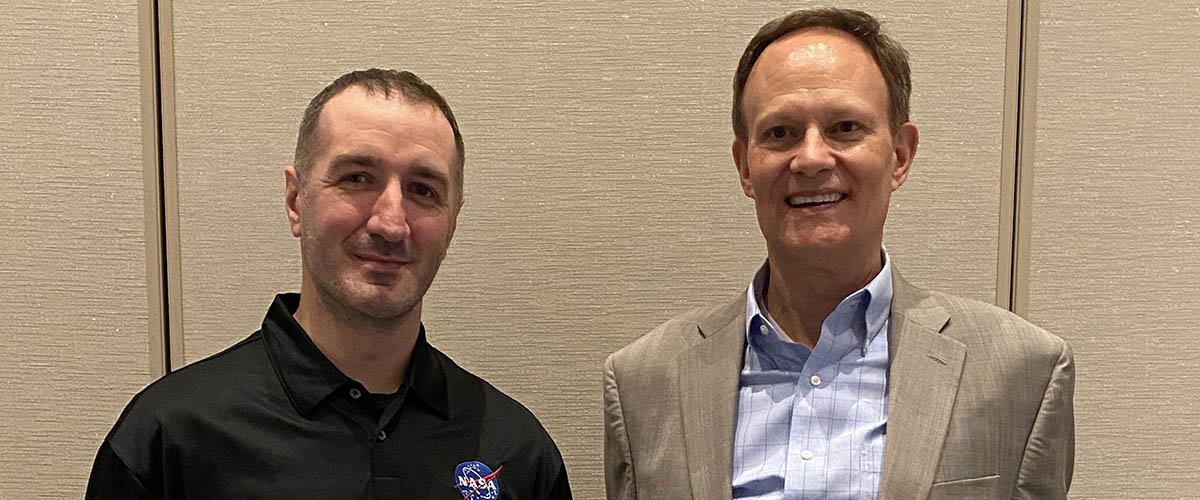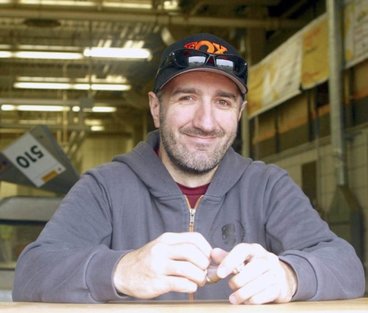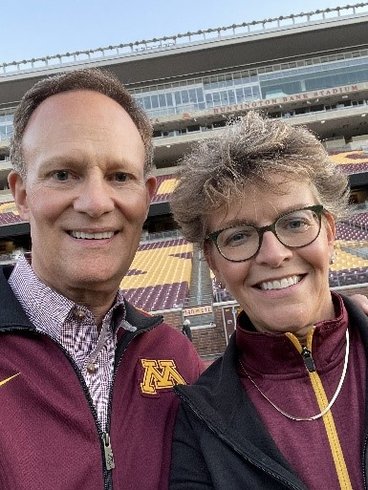
Celebrating educators
CFANS makes history with student-teacher award recipients

Two educators in the CFANS community recently received high honors from the Association for Career and Technical Education (ACTE), one as Teacher of the Year and one as Teacher Educator of the Year. And according to the Star Tribune, “it's believed to be the first time in the association's 95-year history that the Teacher of the Year had been a student of the Teacher Educator of the Year.”
We talked with agricultural education alumnus Luke Becker, BS ‘09, and his former professor at the University of Minnesota Brad Greiman, PhD, about their journeys into teaching and why engaging with future generations matters now more than ever.
Luke Becker, 2021 Teacher of the Year
Agricultural technology and physics teacher at Braham Area High School
Why did you become a teacher? Why agricultural education?
At the end of my 8th grade year, I found out that my dad had cancer and didn’t have that long to live. In 9th grade just before he passed away, we were sitting down to talk through different things. He said, “Promise me you won’t work construction.” By the time I got to be a senior, I kept that promise to my dad. I started thinking about the people who helped me the most — my ag teacher and my guidance counselor — and researched both professions. I wanted to work with students before they needed me and to get the ability to be an FFA advisor who watches over that group of kids. The last 12 years of teaching have been energizing, and I love what I’ve gotten to do with my students so much. I haven't worked a day in my life. I get to play with Legos and build go-Karts.
What is your teaching philosophy?
I adopted the philosophy of: let’s solve real world problems that have more than just a theoretical base, making things that have a purpose and solve a problem. For example, building a washing machine for the international space station. Why this? I could take this to Africa with a small solar panel without soap, without electricity, and without much water and do amazing things. All the challenging things that come up when designing for NASA can be adapted for the Norman Borlaug way of thinking and be adapted to help people. I’m here to encourage students to understand whether what we do in class is something they like and something that they want to become their career.
What three words would you use to describe Dr. Brad Greiman?
He’s a saint. I was a terrible student, I really was, and for a whole lot of different reasons, I gave myself a concussion so bad during finals week of my junior year that I lost some of my senior year. I now know why a “back of the class” kid like I was in high school makes a good teacher, because they know everything that’s going to happen before it does. Dr. Greiman helped show me how to become a front of the class student without losing my ability to observe the world around me. I enjoy our conversations and enjoy our friendship. I called him after we won this award together, and I got to say thank you to him as somebody who invested so much effort in making me a better teacher.
What advice do you have for future agricultural educators?
Do whatever you think is right, but observe what’s happening and don’t be afraid to adjust what you think is right. The world is changing, and it’s important to get things right for the students we’re working with. The times I regret as a teacher are the times I didn’t listen to what my students had to say. The greatest successes and most fun I’ve had is when we try what students suggest. One time we built a 12-foot, to-scale model of the Eiffel Tower because students wanted to do it, and it now sits in the sculpture park in town. When those students come home, they can point it out to people and be proud of something they built.
Brad Greiman, PhD, 2021 Teacher Educator of the Year
Professor Emeritus at the University of Minnesota
Why did you become a teacher? Why agricultural education?
How I became an agricultural education teacher was a journey and I am thankful for the encouragement from colleagues, mentors, and friends. I went to Iowa State University for my undergraduate degree and started in the animal science major. In the summer after my sophomore year, a new high school agricultural education teacher moved into the acreage near our family farm. We got to know each other and he asked me to coach his FFA livestock judging team. I enjoyed teaching the students, and helping them to learn about selecting livestock and giving reasons. About the time I went back to campus for fall semester, the new teacher wrote a letter to the agricultural education department head and noted my potential to become a teacher. The department head arranged a meeting with me, showed me the letter, and we discussed the positive impact a teacher can have on students. My new major became agricultural education.
I graduated from ISU and became an agricultural education teacher at Algona, Iowa. My plan was to teach four years and then return to our family farm and purebred Angus herd. The first-year of teaching was very challenging, however I survived and thrived. By the time I had taught four years, I was enjoying being an agricultural education teacher and this became my career path for 21 years.
I had a great experience being a cooperating teacher for 14 student teachers during my time at Algona, so my next career goal was to become a university professor. Preparing my students to become effective teachers appealed to me as important work. To accomplish this goal, I went to the University of Missouri for my PhD program. Dr. Bob Birkenholz, the agricultural education department head at the time, had encouraged me for a number of years to consider this career path and the timing was finally right.
Why agricultural education? I found the profession very rewarding and it offered multiple ways for me to use my skills and passions. The foundation of agricultural education is based on helping students to learn and develop academically, develop personally through FFA activities, and become career-ready through experiential activities. I treasure my high school and my university teaching experiences. Seeing my former students excel in their career paths and make a difference in so many lives is very satisfying.
What three words would you use to describe Luke Becker?
Luke is a former student of mine and I am very proud of his accomplishments!
- Experiential Learning – Luke provides hands-on, minds-on educational experiences for his students to apply their skills to relevant problem solving. He is highly effective at determining each student’s interests and then providing experiences for them to become immersed in learning. The result is student success, many times by designing and constructing real-life products.
- Innovative – Luke has guided his students to produce amazing accomplishments, some of which are as follows.
- Designing and building ethanol-fueled Super Mileage cars.
- Developing products to improve the lives of International Space Station (ISS) crews.
- Building a prosthetic foot that’s been used by the world’s top paralympic skiers.
- Inventing a washing machine for astronauts’ clothing while on National Aeronautics and Space Administration (NASA) missions.
- Entrepreneur – Luke’s entrepreneurial spirit has resulted in new equipment and cutting-edge technology for his students. He has forged community and area partnerships that resulted in donations and sponsorships. In addition, Luke has been successful in obtaining grants to support his program.
What advice do you have for future agricultural educators?
My first advice is to plan for personal development and professional development experiences during your teacher licensure program. You will feel good about your growth, more confident going into student teaching, and more effective as a first-year teacher.
Next, begin to build your mentor network to support you during the journey to become a teacher. My experience has been that agricultural education colleagues are very willing to talk, provide advice, and share teaching materials with future teachers. Don’t be afraid to ask them tough questions to obtain a helpful perspective.
Finally, when you may be questioning your career path of becoming a future agricultural educator, think back to what first attracted you to the profession. Usually this has something to do with the impact you want to have on your students. Several quotes have inspired me during my career: “A teacher affects eternity. You can never tell where their influence stops,” Henry Adams, and “We make a living by what we get, but we make a life by what we give,” Winston Churchill.
How do you feel when you learn about the successes of former students?
I feel very proud of my former high school, undergraduate, and graduate students when they experience success, and this is a reward of being a teacher! I very much appreciate hearing from a new teacher when they are returning for their second year of teaching. Problem-solving with former students to overcome challenges, and then seeing their success is inspiring. It is very gratifying to see former students experience more and more success in their careers, and become leaders in their communities and organizations. The positive impact former students are making is fantastic.







